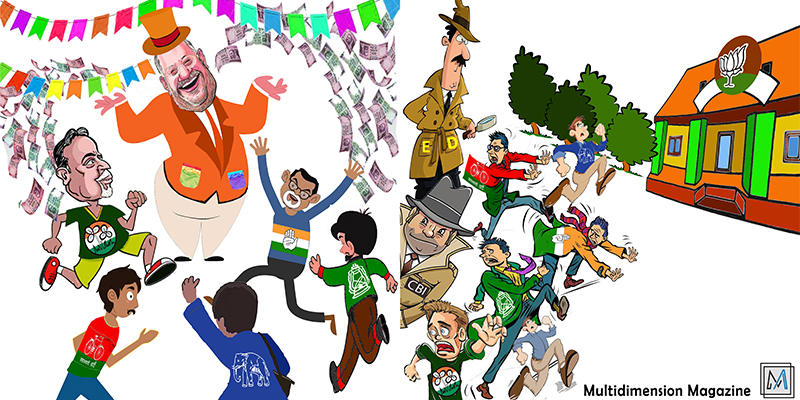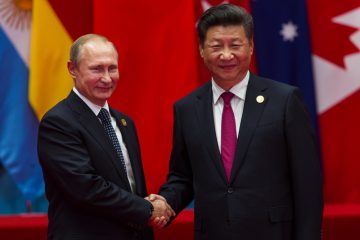Written by : Pratip Chattopadhyay
Illustration : Avijit Ghosh
Summary:
Presently defection in party-politics is becoming the new norm to smoothen the rise of Bharatiya Janata Party(BJP) in the era of second coming of one-party system in Indian democracy. Defection as a practice is as old as party system in a democracy. However the new normaility of defection in Indian context is that defection is not resulting in new party formation or apolitical position but resulting in joining the bandwagon of BJP-ism thereby distorting the very essence of democracy itself, i.e. pluralism. In this context, this article claims that Indian democracy is presently in a ‘defecting’ stage due to the new normal party-swapping tendencies of political leadership not in search of ‘change’ but for ‘continuity’ of one-dominant party presence across the country. This article in its first section reflects the general tendencies in Indian politics and contextualises the argument in second section with more specific example of ensuing legislative election in West Bengal to conclude that
Section I
Political leadership in Indian representative democracy acts usually on party behest to establish connection between the party and the masses. However ‘rebels’ or ‘dissenters’ within the party is usual and their course of action falls within four segments – (i) they break away with followers to form new party (ii) they become politically passive but remains within the party (iii) they join establish bigger political parties which are rivals to their mother party (iv) they move back and forth from their original party to a rival party and back to their original party. This is indeed one form of ‘defect’ in a democratic set-up simply because such party-swapping are devoid of any ideological orientation or programmatic appeal. Mostly such acts are emotional steps primarily on the basis of egoist position claiming for more recognition and dissatisfied with being ‘one among many prominent voices’ within the party to strive to achieve a status of ‘dominant’ voice. While dissent against dominance is to be accepted as a part of thriving pluralist democratic environment within a party or a party-system, defection as an extension of dissent, is a culture that is an element that reflects democratic deficit within a party. Defection takes place due to a disjunction between particular leader and his/her party organisation and often it is seen as a puzzle for both its cause of sudden detachment and its effect on party-politician relationship (Moriss-Jones, 1966; Mitra, 2008).
Historically in the 1960s defection became a major perturbing element in Indian party-politics. Within a brief span of 4 years (1967-71), there were 142 defections in Parliament and 1969 defections in State Assemblies across the country. Thirty-two governments collapsed and 212 defectors were rewarded with ministerial positions. Haryana was the first State where a Congress ministry was toppled due to defection. The Bhagwat Dayal ministry was defeated in the Assembly when its nominee for speakership lost out to another candidate. Congress dissidents defected to form a new party called the Haryana Congress, entered into an alliance with the opposition and formed a new government under the Chief Ministership of Rao Birender Singh (also a Congress defector). Haryana thus became the first State to reward a defector with Chief Ministership. Another Haryana legislator, Gaya Lal, defected thrice within a fortnight. It was to address this issue that the anti-defection law was passed in 1985 (Website 1).
More recently despite having emerged as the single-largest party in Manipur in 2017, the Congress was outmanoeuvered by the BJP which cobbled together a coalition, backed by Congress defectors who had joined it ahead of the election. In February 2019, in Karnataka, 14 Congress and three Janata Dal (Secular) MLAs resigned, precipitating the downfall of the 14-month-old coalition led by HD Kumaraswamy. ten of the eleven defectors who won their by-election on a BJP ticket were offered cabinet positions. In July, 10 of the 15 remaining Congress MLAs announced their resignation in the Goa assembly and merged with the BJP. In March 2020, the Kamal Nath-led government in Madhya Pradesh fell, having lost its majority after 22 of its MLAs resigned, following Jyotiraditya Scindia’s decision to join the Bharatiya Janata Party (BJP). According to Gilles Verniers, “Campaign professionalisation and power centralisation in parties have reduced the role, and loyalty, of legislators” (Verneirs, 2020).
The difference in nature of defection between the 1960s and 1970s and the more recent ones are (a) no new parties / splinter groups are being formed (b) joining BJP which is presently the dominant party to escalate networking between centre and defected leaders (c) a bunch of elected representatives reflecting their prominent position in their own party are defecting together creating an organised defection (d) even without expulsion defection is taking place (e) defectors are not accusing top-brass central leadership but the corporatisation of party-functioning supported by mid-level leaders who are taking upper-hand role in party functioning. This differential pattern defect the democratic milieu in India as it plays with the support and faith of electorates who voted for them due to their affiliation to the party from which they are defecting mid-way to a party against whom they secured votes! Such a caricature of ‘political’ is being played out in West Bengal off late which has a scheduled legislative assembly election in mid-May 2021.
Section II
West Bengal politics is known for determination, dedication and discipline right from the formative years of Indian independence movement carried forward by the ideological orientation of leftist politics that directed the course of state politics from 1970s onwards. The leftist lineage in West Bengal ended in 2011 with Trinamul Congress(TMC) defeating the uninterrupted three and a half decade of Left Front rule. Before that historic election, defections from left parties to TMC was not registered much but gradually after 2011 defection from Left parties as well as from Indian National Congress became the order of the day primarily among lower and middle level leaders who with their supporters joined Trinamul Congress. Abdul Rezzak Mollah is the only front line Left leader who acted as a minister in Left Front government joined Trinamul Congress in 2014 and got a ministerial berth as well in TMC government in 2016. Somen Mitra, a prominent leader of Indian National Congress with his wife defected to Trinamul Congress became MP and again returned to Congress within a span of four years getting disgruntled with TMC management. So till 2017 defection in West Bengal politics was not rampant. However with the making of 2019 Lok Sabha elections, defection from Trinamul Congress to BJP became rampant and part of political culture. TMC party heavyweight Mukul Roy, sitting MP like Soumitra Khan, Anupam Hazra, former Mayor of Kolkata and TMC leader Sovondeb Chattopadhyay, TMC party leader Sabyasachi Dutta, are among the prominent faces to switch side before and after 2019 Lok Sabha polls. The most stunning large scale defection took place on 19th December 2020 when sitting 7 MLAs, 1 MP and 40 odd leaders and elected representative of various levels of TMC party hierarchy joined BJP led by TMC minister and prominent party face Suvendhu Adhikary. Interesting that one time BJP leader Col. Diptangshu Chowdhury who defected to join TMC on the very day again defected from TMC to join BJP. The major reason given for such an act mostly by all is not grievance against Mamata Banerjee, the party supremo but against son of Mamata’s brother, MP Abhishek Bandopadhyay’s highhandedness and activity of Prashant Kishor, the post-2019 election strategy making specialist head and his team, who has been hired by TMC to correct its electoral strategy.
This is in sharp contrast to the examples of Kabir Suman and Kunal Ghosh, both former MPs of TMC. Suman, a public intellectual and singer, charmed by the promise of change of Mamata Banerjee, joined TMC in 2011 and after got elected as MP but was first to voice his disenchantment with Mamata style of hegemonic management and declared that Mamata’s primise of ‘change’ was ‘betrayal of the century’. However Kabir Suman got politically detached from TMC but never joined other party against whom his fight was recorded. TMC Rajya Sabha MP Kunal Ghosh was jailed for money laundering by CBI and at that time MP Ghosh commented critically on the distanciation by TMC with him but after being released slowly and gradually Kunal Ghosh again became part and parcel of TMC. Even Rajib Bandopadhyay, sitting MLA and party leader Jitendra Tiwari, voiced their severe disgust against TMC functioning but didn’t took the defection step. This proves that defection can be avoided if there is resoluteness for that.
Conclusion:
Going deep into the philosophical orientation of current defecting trend in Indian party politics it can be seen as a battle between questioning the pattern of redistribution of welfare, resources and service to the public by the party and recognition of solutions offered to correct such pattern. Nancy Fraser and Axel Honneth(2003) examine the relationship between redistribution which refers to material inequalities and recognition which designates inequalities of status or identity. According to Fraser, recognition is a political category, not a moral and psychological one. In her view, recognition is a matter of social justice. This leads her to state what she believes to be the basic principle of modern democratic politics – namely ‘parity of participation’. This principle asserts that social institutions must ensure that each person is in a position to interact with others as an ‘equal’. As exemplified by the example of recent defections from Indian National Congress and Trinamul Congress for BJP across several states, ensuring parity of participation is going to be the major task of political leadership of parties to manage party-politics and win elections in the present day of 24×7 media gaze on affairs of party-politics.
Practically defects in Indian democratic experience have been structurally inbuilt from politics of appeasement to politics of exclusion and inclusion, from mandir-masjid debate to politics of religiosity, from mediatisation of politics to criminalisation of politics, from casteist politics to corporatist politics. Indian democratic experience has been robbed off essentials of dialogue on, determination about and dedication for public welfare and public service. Slavoj Zizek, the French philosopher designates the current leftist leaders across the globe struggling to sail somehow within the bourgeoisie parliamentary democratic setup as ‘Fukayama leftists’ who think that living in capitalist democratic times is the end all of modern society. Drawing on Zizek, it can be concluded that present genre of leadership who are happy to defect are ‘Fukayama-ist’ doomed to believe, albeit wrongly, that rise of BJP is the end-all of Indian political historiography.
References:
W.H. Morris-Jones(1966): Dominance and Dissent: Their inter-relations in the Indian party system, Government and Opposition, Vol. 1, No. 4 (August 1966), pp. 451-466
Subrata K. Mitra(2008): When Area Meets Theory: Dominance, Dissent, and Democracy in India, Indian Political Science Review, Vol. 29, No.5, pp 557-578
Gilles Verniers(2020): https://www.hindustantimes.com/analysis/why-defections-continue-to-cast-a-shadow-on-politics/story-4Fs0vOMzmpBX9YVYiadMsL.html, accessed on 12.12.2020
Nancy Fraser and Axel Honneth(2003): Redistribution or Recognition? A Political-Philosophical Exchange, Verso, London
Website 1: https://www.prsindia.org/theprsblog/politics-defection accessed on 14.12.2020
About the author :
Pratip Chattopadhyay
Assistant Professor, Dept. of Political Science, University of Kalyani, West Bengal, India




